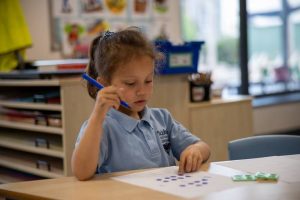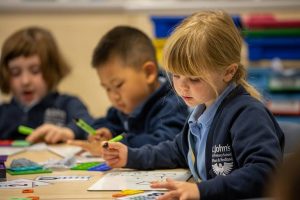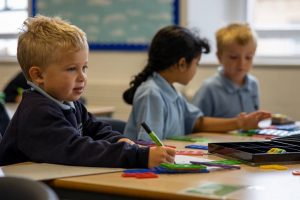Mathematics Vision Statement

‘We will always have STEM with us. Some things will drop out of the public eye and go away, but there will always be science, engineering and technology. And there will always, always be mathematics.’ (Katherine Johnson, African-American Mathematician, NASA)
At St John’s, we believe that every child is entitled to a high-quality maths education. We recognise that mathematics is essential to everyday life because it provides a foundation for a range of subjects and enriches our understanding of society and the world. We feel passionate that all children foster a love for the subject and become happy, adventurous mathematicians who celebrate their successes and value the learning that comes from their mistakes. We want the children at St John’s to appreciate the beauty and power of maths and as a result, continue their journey as mathematicians into further education and into their future lives with curiosity and confidence.
Ethos and Aims
At St. John’s, we recognise that Mathematics is essential to everyday life and provides a foundation for a range of subjects and our understanding the world.
We feel passionate that all children should be given opportunities to appreciate the beauty and power of mathematics and should therefore develop a sense of enjoyment and curiosity about the subject.
 We follow the National Curriculum which focuses on the teaching of the following three fundamentals:
We follow the National Curriculum which focuses on the teaching of the following three fundamentals:
- becoming fluent in the fundamentals of mathematics, including through varied and frequent practice with increasingly complex problems over time, so that pupils develop conceptual understanding and the ability to recall and apply knowledge rapidly and accurately.
- reasoning mathematically by following a line of enquiry, conjecturing relationships and generalisations, and developing an argument, justification or proof using mathematical language.
- solving problems by applying their mathematics to a variety of routine and non-routine problems with increasing sophistication, including breaking down problems into a series of simpler steps and persevering in seeking solutions.
 Developing Knowledge and Understanding
Developing Knowledge and Understanding
Across the school, we teach Maths in a practical way giving children opportunities to explore number relationships using models, images and manipulatives including Numicon, Dienes and Cuisenaire Rods. Once children have a secure understanding of mathematical concepts, we challenge them to solve more abstract and complex problems through offering a variety of rich, mathematical tasks as opposed to moving them on to new content. Application in a range of concepts, reasoning and exploring mathematical ideas are a key part of learning and challenge for our children.
In lessons we link maths concepts to the real world beyond the classroom so that children develop an appreciation of the application of maths for future employment and real life. We don’t use a particular ‘maths scheme’ as such, but we do use a variety of published and online resources. Our teachers are very skilled at structuring lessons and tailoring material to embed learning and provide stretch and challenge.
We know that children need to revisit areas of maths on a regular basis. We therefore plan in daily ‘refresher’ opportunities, this ‘spaced practice’ challenges children to retrieve information and use it to solve a particular question. We also revisit whole maths topics, using prior learning to ensure children don’t repeat something they already know and they then extend their learning and stretch their thinking. All this really helps to ensure maths concepts ‘stick’.
 Multiplication Tables
Multiplication Tables
Multiplication tables form a fundamental part of Maths teaching and learning so, particularly from Years 1-4, time is dedicated to supporting children to learn these facts. It is a key area where parents can support at home and we aim that all children are familiar with their tables up to 12×12 by the end of Year 4.
With this knowledge secure at this time, children are able to better learn other areas of the maths curriculum in Year 5 & 6 and beyond; children are also required to undertake a ‘Multiplication Tables Check’ at the end of Year 4.
In Year 5&6, children are given regular opportunities to revisit this knowledge through a variety of activities such as times table grids which you can access here.
 Maths Talk
Maths Talk
Research has shown that ‘talk’ in Maths is a highly beneficial element of learning and so, as well as allowing many opportunities for this within lessons, we use an adaptation of ‘Number Talks’ as a key strategy for this.
At St. John’s, it has proved itself to be highly successful in developing children’s confidence, understanding and enjoyment of the subject, allowing children regular opportunities to share out loud their thinking with others and pick apart common misconceptions – all of which underpins successful learning in Maths.
Addition and Subtraction Skills Progression Document
Geometry position and direction Skills Progression
Geometry properties of shape Skills Progression
Measurement Skills Progression
Multiplication and Division Skills Progression
Number and Place Value Skills Progression
